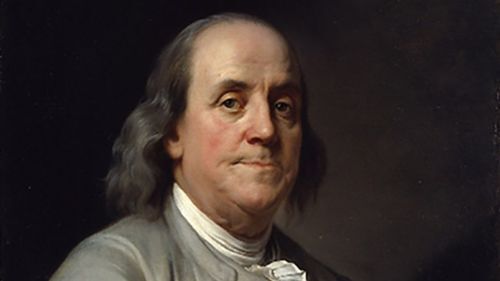


By Steve Sailer
12/18/2014
From Chronicles:
Benjamin Franklin’s American Dream Steve Sailer — DECEMBER 12, 2014
Today’s preferred way to think about immigration and the nation-state is exemplified in the title of a 1964 pamphlet that the Anti-Defamation League published posthumously under the name of John F. Kennedy: A Nation of Immigrants. The next year, the martyred President’s brother Teddy had his name put on the 1965 immigration act of such large and unforeseen consequence.
The pages of JFK’s little book are seldom read anymore, but its mantra of a title has proved wildly successful at sacralizing mass immigration as some kind of hereditary national onus. “My fellow Americans, we are and always will be a nation of immigrants … . That’s the tradition we must uphold. That’s the legacy we must leave for those who are yet to come,” orated President Barack Obama as justification for his November 2014 demand that, when it comes to immigration, America must have a government of men and not of laws.
While the Preamble states that the Constitution is ordained so that “We the People of the United States” can “secure the blessings of liberty to ourselves and our posterity,” the concept of posterity has vanished from respectable immigration discourse. The Obama amnesty invokes a civil right to be here that illegal aliens inherit, but not from their ancestors: Like insanity, amnesty is hereditary; you get it from your children. After all, we live in an age of globalism and minoritarianism: The 300 million American citizens are the majority, while the 7 billion foreigners are the minority.
This slogan of a Nation of Immigrants has not proved terribly productive intellectually, fostering not unsentimental scholarship but schmaltzy ancestor worship. For example, when it was revealed in the press last year that Dr. Jason Richwine had earned his Harvard Ph.D. by quantitatively analyzing the achievements of Hispanics over multiple generations, finding that today’s illegal-alien “Dreamers” and their children were unlikely to live up to the fond hopes so casually invested in them, he was immediately shoved out of his job at a conservative think tank.
In sharp contrast to this dead end for scholarship, Benjamin Franklin’s arguments in favor of immigration restrictions were influential on the central avenue of Anglo-American thought in the human sciences.
Franklin’s 1751 pamphlet Observations Concerning the Increase of Mankind offered a workable strategy for America’s future. These 24 numbered paragraphs were the cogent cornerstone of Franklin’s audacious scientific-strategic theory for the peopling of America, an interlocking series of arguments about how the world would work. Sociologist Dennis Hodgson observes that, in Observations, “Policy did not flow from theory[;] theory flowed from policy.” But the policy Franklin advocated was so fruitful over the next two centuries that the theory deserves respect.
Hodgson explains Ben Franklin’s American Dream:
Living in the mid-eighteenth century, [Franklin] had a vision of a middle-class society that was necessarily one in which the majority owned and worked their own lands … . His dream was of a prosperous and middle-class America, peopled largely by the English, that spanned a continent and confidently assumed a preeminent place among nations.
In 1964, four decades after mass immigration had been shut down, the country looked rather like Franklin’s vision. But the mechanisms Franklin had identified as crucial to American happiness have been increasingly forgotten during the ensuing Nation of Immigrants nostalgiafest.
This Founding Father’s insights on population and immigration are so out of fashion as to make his entire perspective almost incomprehensible to mainstream minds. For example, in his bestselling 2003 biography Benjamin Franklin: An American Life, the intelligent establishmentarian Walter Isaacson (the authorized biographer of Steve Jobs) issues a few baffled apologies for this epoch-making essay, then quickly moves on to more congenial matters.
Read my whole article there.